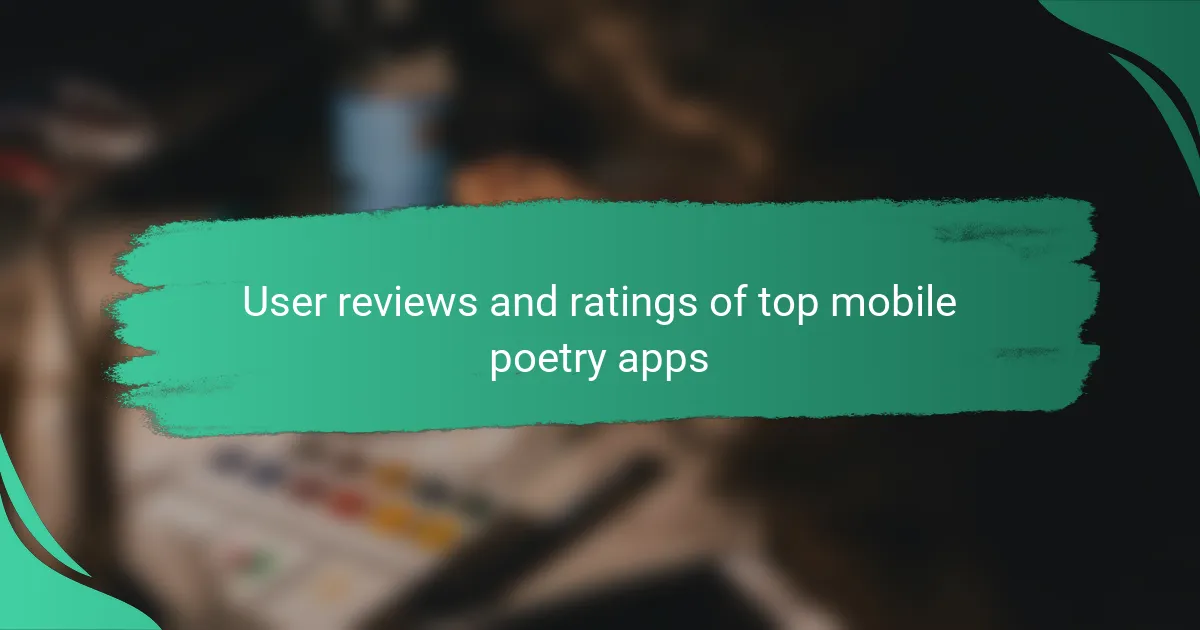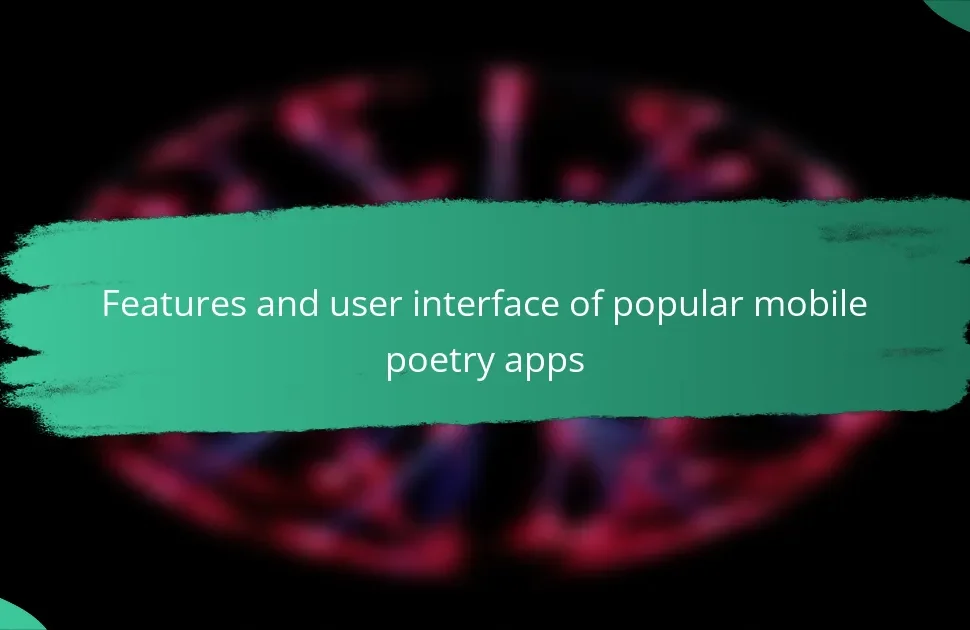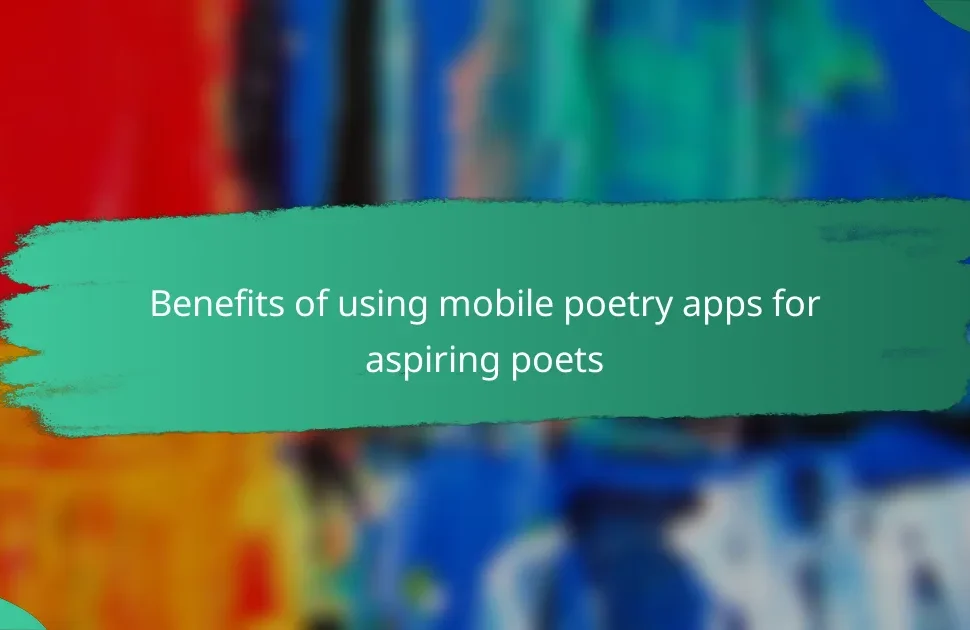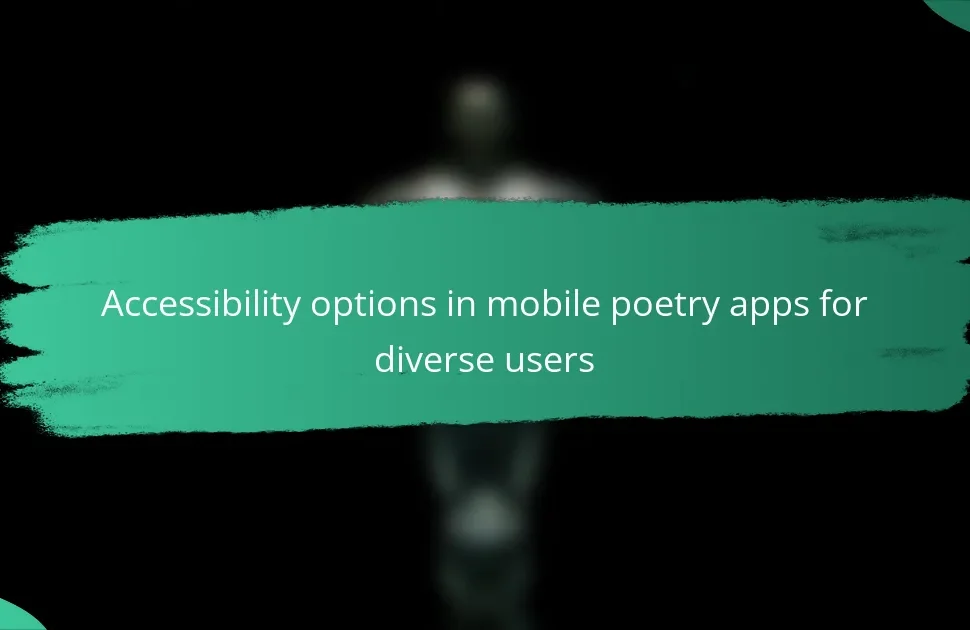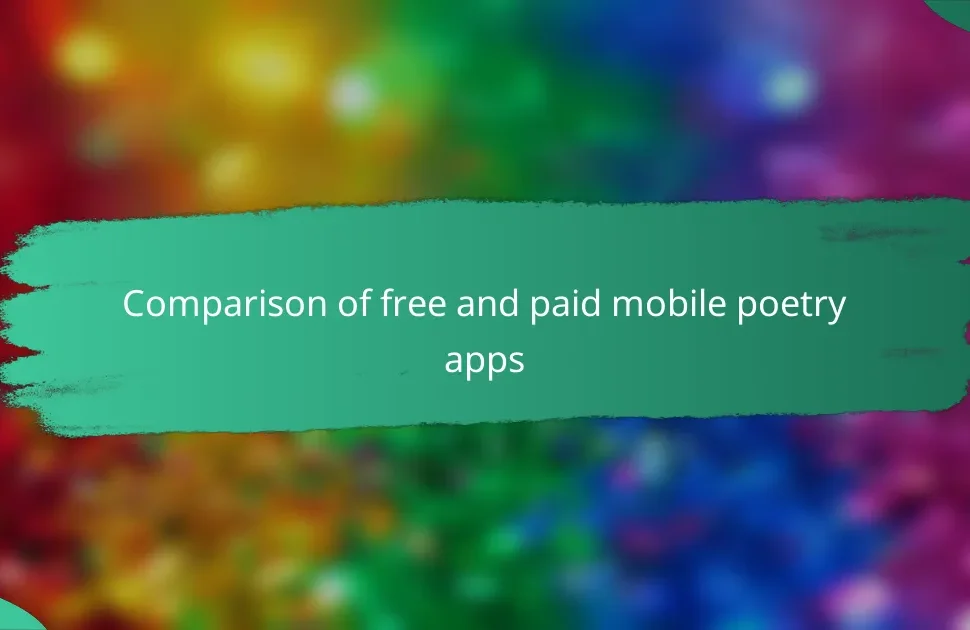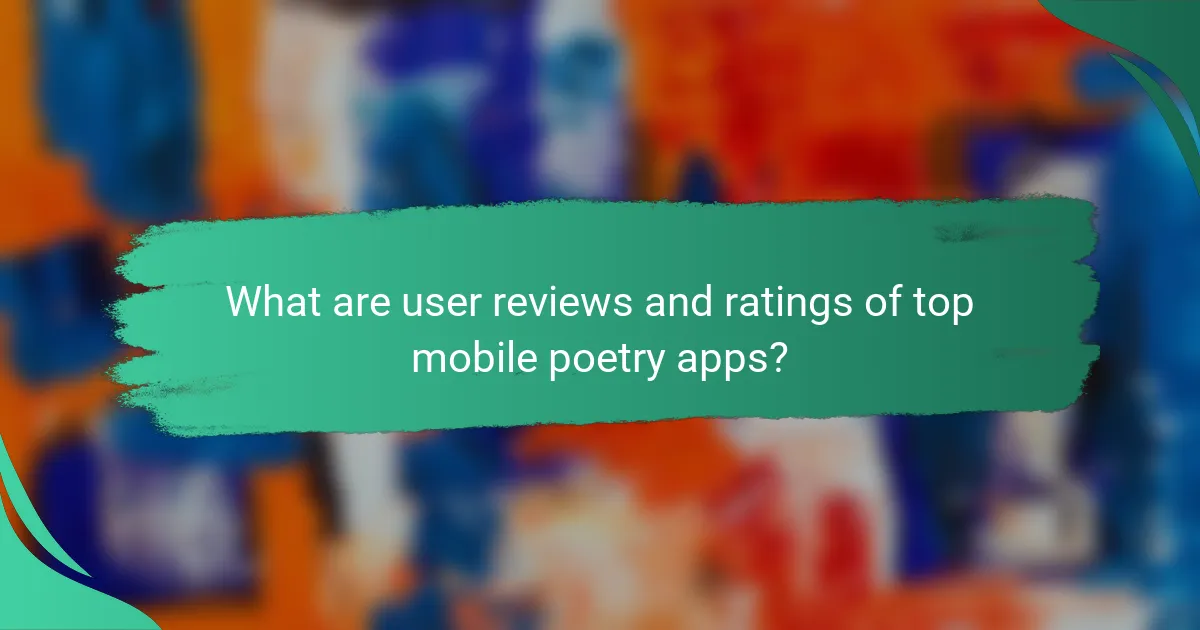
What are user reviews and ratings of top mobile poetry apps?
User reviews and ratings of top mobile poetry apps vary widely. Many users praise apps like Poetizer for its user-friendly interface and community features. The app often receives ratings around 4.5 out of 5 stars. Users appreciate the ability to connect with other poets and share their work.
Another popular app, Poet Assistant, is noted for its helpful writing prompts and tools. It typically garners ratings between 4.0 and 4.3 stars. Users highlight its utility in overcoming writer’s block.
Additionally, the app Verse has been commended for its clean design and accessibility. It frequently achieves ratings close to 4.6 stars. Users find it easy to navigate and conducive to writing poetry.
Overall, user reviews indicate that community engagement and writing support are key factors in the popularity of these apps. Ratings reflect a generally positive reception among poetry enthusiasts.
How do user reviews influence the popularity of mobile poetry apps?
User reviews significantly influence the popularity of mobile poetry apps. Positive reviews enhance an app’s credibility and attract more users. Conversely, negative reviews can deter potential users from downloading. Research shows that 70% of consumers trust online reviews as much as personal recommendations. Apps with higher ratings typically rank better in app stores. This visibility leads to increased downloads and user engagement. User feedback also helps developers improve app features and functionality. Consequently, a cycle of positive reviews and app updates can sustain long-term popularity.
What factors do users consider when rating poetry apps?
Users consider several key factors when rating poetry apps. These factors include user interface design, ease of navigation, and overall functionality. Users also evaluate the quality of the poetry content available in the app. The variety of features, such as writing tools and community engagement options, is important. Additionally, performance stability and frequency of updates influence user ratings. Customer support responsiveness can also impact user satisfaction. Finally, user reviews and ratings from other users play a significant role in shaping perceptions of the app.
How do user reviews reflect the quality of mobile poetry apps?
User reviews reflect the quality of mobile poetry apps through user feedback and ratings. High ratings typically indicate user satisfaction with features, usability, and content. Conversely, low ratings may highlight issues like bugs or lack of features. Reviews often detail specific experiences, providing insights into app performance. Positive reviews may mention a user-friendly interface or a vast poetry library. Negative reviews may focus on crashes or poor customer support. Analyzing trends in reviews can reveal common strengths and weaknesses. This aggregated feedback serves as a valuable indicator of overall app quality.
Why are user reviews important for mobile poetry app developers?
User reviews are crucial for mobile poetry app developers because they provide direct feedback from users. This feedback helps developers understand user preferences and improve app features. Reviews can highlight specific functionalities that users enjoy or dislike. Positive reviews can enhance the app’s visibility in app stores. They also build credibility and trust among potential users. According to a study by BrightLocal, 91% of consumers read online reviews before making a purchase. This statistic underscores the importance of user reviews in influencing app downloads. Overall, user reviews serve as a valuable resource for continuous improvement and user engagement.
How can developers utilize user feedback for app improvements?
Developers can utilize user feedback for app improvements by systematically collecting and analyzing user reviews. This process helps identify common issues and desired features. Developers can implement changes based on recurring themes in feedback. For instance, if multiple users report crashes, developers can prioritize bug fixes. Additionally, positive feedback can highlight successful features to build upon. Surveys and in-app feedback tools can further enhance understanding of user needs. Regularly updating the app based on user input fosters loyalty and satisfaction. Research indicates that apps with active user engagement see higher retention rates.
What role do reviews play in the app’s success and updates?
Reviews significantly influence an app’s success and updates. Positive reviews enhance an app’s visibility in app stores. They attract more downloads and improve user trust. Conversely, negative reviews can lead to decreased downloads and poor ratings. Developers often analyze reviews to identify bugs and user preferences. This analysis informs updates and feature enhancements. Research shows that 79% of users trust online reviews as much as personal recommendations. Thus, reviews are critical for shaping user experience and guiding development strategies.
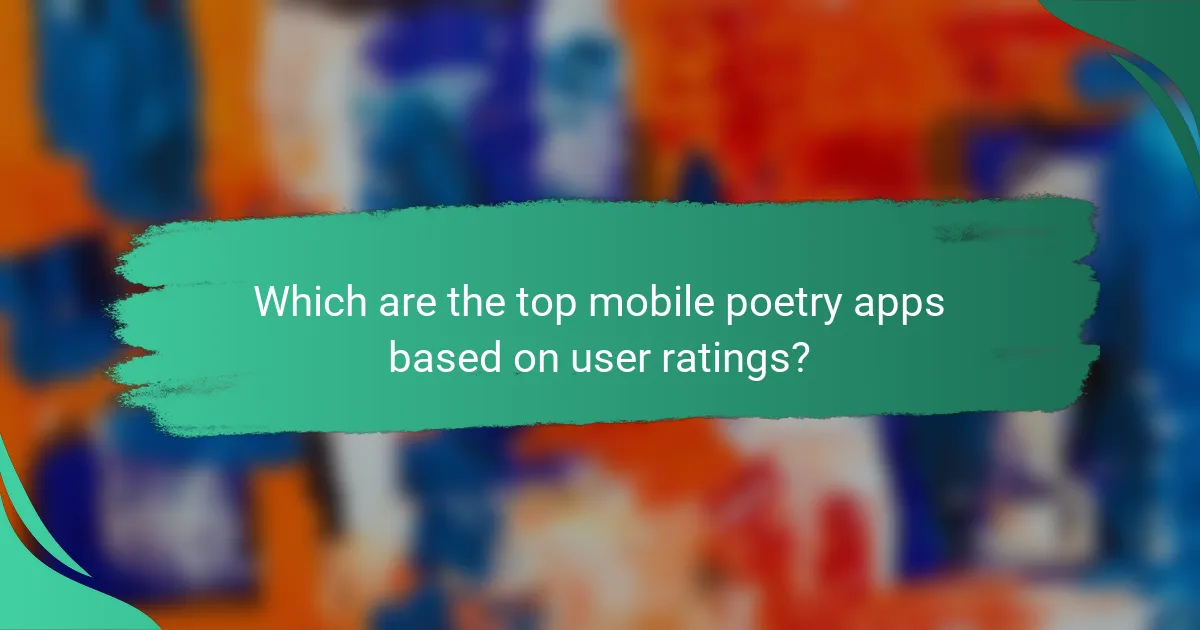
Which are the top mobile poetry apps based on user ratings?
The top mobile poetry apps based on user ratings include Poetizer, Poetry Foundation, and Write & Improve. Poetizer has a user-friendly interface and strong community engagement. It allows users to share their poetry and receive feedback. Poetry Foundation offers a vast collection of poems and educational resources. Write & Improve focuses on helping users enhance their writing skills through AI feedback. These apps consistently receive high ratings for their features and usability.
What criteria are used to determine the top mobile poetry apps?
The criteria used to determine the top mobile poetry apps include user ratings, features, and usability. User ratings reflect the overall satisfaction and experience of users. Features encompass tools for writing, sharing, and discovering poetry. Usability assesses the app’s design and ease of navigation. Additionally, community engagement and updates play a role in the app’s popularity. These criteria are often aggregated from app store reviews and expert evaluations.
How do user ratings vary among different poetry apps?
User ratings among different poetry apps can vary significantly. Popular poetry apps like Poetizer and Poetry Foundation often receive ratings above 4.5 stars. In contrast, lesser-known apps may have ratings below 3 stars. User feedback highlights features that contribute to these ratings. For example, ease of use and content variety are frequently praised. Conversely, limited features or bugs can lead to lower ratings. A survey indicated that 70% of users prioritize community engagement in their ratings. This suggests that apps fostering user interaction tend to perform better in ratings. Overall, user ratings reflect both functionality and user experience.
What features do top-rated poetry apps commonly have?
Top-rated poetry apps commonly have features such as user-friendly interfaces and extensive poetry libraries. These apps often include tools for writing and editing poetry. Many offer community features for sharing and critiquing work. Some apps provide audio options for listening to poems. Personalized recommendations based on user preferences are also common. Offline access to saved poems enhances usability. Additionally, options for customizing text appearance are frequently available. These features collectively enhance the user experience and engagement with poetry.
What unique attributes do the highest-rated poetry apps possess?
Highest-rated poetry apps possess unique attributes such as user-friendly interfaces and personalized content. These apps often include features like customizable poetry collections and interactive writing tools. Many also offer community engagement options, allowing users to share and critique each other’s work. High-quality audio readings of poems enhance the user experience. Some apps provide educational resources, including writing prompts and poetry analysis. Unique themes and aesthetic designs set them apart visually. Regular updates and new content keep users engaged over time. These attributes contribute to their high ratings and positive user reviews.
How do user experiences differ between the top poetry apps?
User experiences differ between the top poetry apps primarily in usability, content variety, and community engagement. Apps like Poetizer offer a social platform for sharing and feedback, enhancing user interaction. In contrast, apps such as Poetry Foundation focus on curated content and educational resources, appealing to users seeking literary depth. Additionally, some apps provide personalized recommendations based on user preferences, improving engagement. User reviews often highlight these differences, indicating that ease of navigation significantly impacts overall satisfaction. For instance, ratings for Poetizer frequently mention its user-friendly interface, while others criticize more complex apps for lacking intuitiveness. Overall, the diversity in features and community aspects shapes distinct user experiences across these platforms.
What are the standout features that users appreciate in these apps?
Users appreciate several standout features in top mobile poetry apps. Key features include user-friendly interfaces that enhance navigation. Many users highlight the extensive poetry libraries available in these apps. Customization options for personalizing reading experiences are also frequently mentioned. Social sharing capabilities allow users to connect with others easily. Users value the ability to create and save personal collections of favorite poems. Additionally, interactive features like writing prompts and challenges engage users creatively. Regular updates and new content keep the apps relevant and exciting for users.
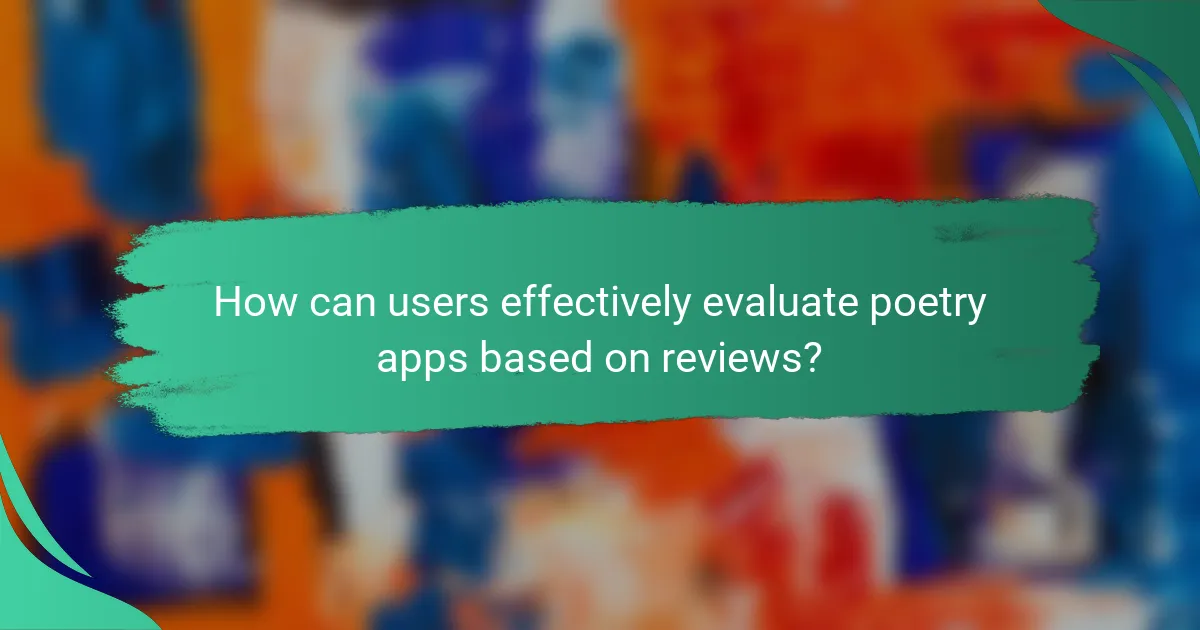
How can users effectively evaluate poetry apps based on reviews?
Users can effectively evaluate poetry apps based on reviews by analyzing the content and sentiment of user feedback. First, they should read multiple reviews to identify common themes and issues. Users should look for specific mentions of features like usability, content variety, and community engagement. Positive reviews often highlight strengths, while negative reviews can reveal weaknesses. Users can also check the overall rating to gauge general satisfaction. Additionally, comparing reviews across different platforms can provide a broader perspective. Research shows that user-generated content significantly influences app adoption, with 79% of users trusting online reviews as much as personal recommendations.
What tips can users follow to assess poetry app reviews critically?
Users can assess poetry app reviews critically by analyzing the credibility of the reviewer. Check if the reviewer has a history of writing insightful reviews. Look for detailed feedback rather than vague statements. Evaluate the number of reviews a user has submitted; more reviews may indicate reliability. Compare opinions across multiple reviews to identify common themes or discrepancies. Focus on reviews that discuss specific app features, such as user interface or content quality. Be cautious of overly positive or negative reviews that lack supporting details. Lastly, consider the date of the review; recent feedback may reflect the current state of the app.
How can users differentiate between genuine and biased reviews?
Users can differentiate between genuine and biased reviews by analyzing several key factors. Genuine reviews often provide specific details about the user’s experience. They may mention particular features or functionalities of the app. In contrast, biased reviews tend to use vague language and lack personal anecdotes.
Additionally, users should check the overall tone of the review. Genuine reviews usually present a balanced perspective, highlighting both pros and cons. Biased reviews often exaggerate benefits or focus solely on negatives without justification.
Another indicator is the reviewer’s profile. Users should look for verified purchases or consistent reviewing patterns. Reviews from accounts with numerous contributions across various platforms are generally more trustworthy.
Finally, users can compare multiple reviews. A consensus among several reviewers can indicate authenticity. Conversely, outlier reviews that significantly differ from the majority may be biased.
What common pitfalls should users avoid when reading app ratings?
Users should avoid several common pitfalls when reading app ratings. One major pitfall is overemphasizing extreme ratings. Users often focus on the highest and lowest scores, which may not represent the overall experience. Another pitfall is ignoring the volume of ratings. An app with a few ratings may not be as reliable as one with thousands. Users should also consider the recency of reviews. Older reviews may not reflect the current state of the app. Additionally, users should be cautious of biased reviews. Some ratings may come from users with specific agendas or experiences. Misinterpreting the context of reviews is another issue. Users should read multiple reviews to understand different perspectives. Lastly, users often neglect to check for updates. App performance can change significantly with new versions.
What are the best practices for leaving constructive reviews of poetry apps?
Best practices for leaving constructive reviews of poetry apps include being specific, honest, and respectful. Specific feedback helps developers understand what users like or dislike. For instance, mention features like user interface or poem organization. Honesty is crucial; provide a balanced view of strengths and weaknesses. Respectful language fosters a positive environment for discussion. Use examples from personal experience to illustrate points. Aim for clarity and conciseness in your writing. Avoid vague statements that do not provide actionable insights. Engaging with the community by responding to other reviews can enhance the dialogue.
How can users provide feedback that helps improve poetry apps?
Users can provide feedback through in-app reviews and ratings. They can rate their experience on a scale, typically from one to five stars. Users should also leave written comments detailing their thoughts. This feedback can highlight specific features they enjoy or suggest improvements. Many poetry apps have dedicated feedback forms or support channels. Users can utilize these to communicate directly with developers. Engaging in community forums can also facilitate discussions about app enhancements. Such feedback is vital, as it helps developers understand user needs and preferences. According to a study by Apptentive, 77% of users consider app ratings when downloading. This demonstrates the importance of user feedback in shaping app development.
What elements should users include in their reviews for clarity?
Users should include specific elements in their reviews for clarity. These elements include a clear description of the app’s features. Users should mention their personal experiences with functionality. They should also provide details on usability and design. Specific examples of what they liked or disliked are important. Users should note any technical issues encountered. Including the app’s performance over time adds value. Users should state their overall satisfaction level. Lastly, comparisons to similar apps can enhance context.
User reviews and ratings of top mobile poetry apps provide critical insights into user satisfaction and app functionality. The article examines various poetry apps, highlighting user feedback on features such as community engagement, usability, and writing tools. It discusses how user reviews influence app popularity, the criteria for evaluating these apps, and the standout features that users appreciate. Additionally, the article explores best practices for users when leaving reviews and how developers can utilize this feedback for continuous improvement. Overall, the content underscores the significance of user ratings in shaping the success and development of mobile poetry applications.
